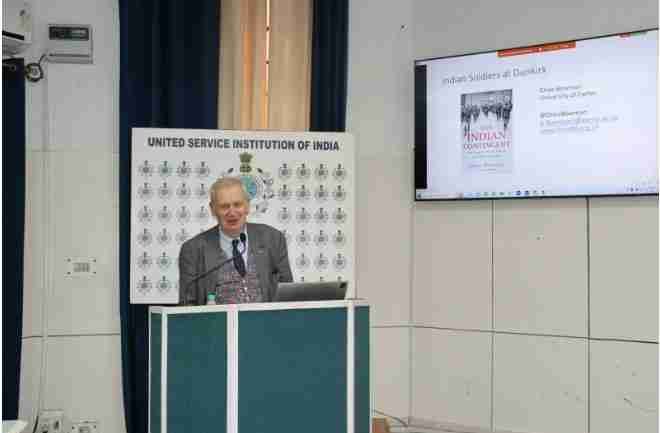The contribution of the Indian soldiers to the Great Wars was immensely significant to the Allied Victory. From fighting in trenches during World War I to fighting along the coast of Dunkirk, Indian soldiers displayed great courage and strength during the Great Wars. To honour and commemorate the contribution of Indian soldiers, the United Service Institution of India (USI) and Indian Council of world Affairs (ICWA) organized a joint international conference on ‘The Diplomatic Dimensions of Military History: Indian Armed Forces in France and Flanders during WWI and WWII’ on 11 April 2023 at USI, New Delhi.
The aim of the conference was to recall the bravery and professionalism of the Indian soldiers, without whom the Allied victories would not have happened and its repercussions that are relevant even today. During the First World War, India’s soldiers served with honour in France, Belgium, Aden, Arabia, East and West Africa, Somalia, Gallipoli, Egypt, Iraq, Palestine, Iran, Salonika, Russia, and even China. Without the participation of the Indian Army the history of the war, and the world, would have been very different. By the end of the war in 1918, over 1.3 million Indians had served overseas with over 74,000 casualties.
In the Second World War, the Indian Army contributed almost 2.5 million men by August 1945. It was the largest volunteer army in human history. Indian soldiers were deployed in the East against the Japanese and in The Middle East, East Africa, North Africa and Italy against the Germans & Italians; yet the first Indian contingent, called Force K-6, was despatched in 1940 to support the Expeditionary Force in France.
The conference was graced by a number of prolific historians, academicians and diplomats. The proceedings of conference began with the Welcome Remarks delivered by Maj Gen BK Sharma, AVSM, SM* (Retd), DG USI. He began by highlighting the role of the Indian soldiers during both the World Wars in enhancing global security. He relayed how Indian soldiers upheld the values of “namak, nishan, naam; ijjat and iqbal” while fighting for the Allied forces. This was followed by the Keynote Address delivered by Ambassador Vijay Thakur Singh; DG ICWA. She spoke elaborately about the Indian soldiers who fought in the First World War, Most of these soldiers were deployed in the Ypres Salient in Flanders in Belgium and at nearby Neuve Chapelle in France during the period 1914-15. Indian soldiers had arrived in Europe at a critical period of the First World War and despite serious limitations in equipment and lack of training, as compared to the European soldiers, they were able to not only hold their section of the line, but also prove their valour and capabilities.
India’s contribution during the Great Wars not only proved its mercenary capabilities but enhanced India’s position in the international sphere. As a result of the contributions by India to World War I, she was included in the delegation to the Paris Peace Conference and became a signatory to the Treaty of Versailles signed on 28 June 1919. The Treaty of Versailles established the first multilateral inter-governmental organization, the League of Nations. Membership of the League of Nations also catalysed the establishment, of India’s first diplomatic representation abroad, the Indian High Commission in London. The first Indian delegations to the League of Nations General Assembly were led by the Indian High Commissioner in London. Later, with the establishment of the United Nations, India also became a founding member in 1945. At a time when the multilateral system is facing unprecedented challenges, India’s contribution to its creation a century ago needs to be recalled. India’s contribution to the Great Wars found itself a host of allies to reckon with-the United Kingdom, France and Belgium among others.
The Conference was also graced by the Ambassadors to India from Belgium, France and the United Kingdom to exalt the long relationship that India holds with these countries. HE Mr Didier Vanderhasselt, Ambassador of Belgium to India in his speech spoke about the long diplomatic relation between India and Belgium of 75 years. He stressed on reinforcing this engagement through the political and commercial ties. HE Ms Christina Scott, CMG, Deputy High Commissioner of the UK to India began her speech by tracing the contribution of the Indian soldiers during the Great Wars and went on to speak about Victoria Cross winners like Rfn Kulbir Thapa and Rfn Gabar Singh Negi who displayed conspicuous courage in the field and led their team to victory. HE Mr Emmanuel Lenain, Ambassador or France to India, expressed his gratitude to the Indian soldiers for their contribution during the Great Wars and acknowledged the growing relations between India-France.
Interestingly, the contribution of Indian soldiers during the First World War is being taught in French schools. Two such scholars who spoke at the conference were- Mr Louis Teyssedou and Mr Jérôme Janczukiewicz. Mr Teyssedou had attended the conference in person accompanied by 12 students and two teachers from Amiens, France. The students had presented alongside Mr Teyssedou and engaged the crowd with archival photographs that were observed through 3D glasses. Mr Jérôme Janczukiewicz on the other hand spoke about the Indian Labour Corps (ILC) in Eastern France, 1917-1919. The ILC went to Lorraine, near Nancy, to dig and carry supplies to build a series of airfields for the Royal Flying Corps. The study was made with the support of the pupils from Arthur Varoquaux Regional School.
The experiences of the Indian soldiers in European and the colonial discrimination of ‘Us’ vs ‘Them’ had moved the Indian soldiers to rise above the caste, ethnic and religious difference and fought the enemy as an unit. The earlier military experiences of the Indian soldiers in Europe were deliberated by Dr Dominiek Dendooven, a Belgian historian, who described the Indian soldiers as rising above the military exploits and becoming agents of chance to make India into becoming the nation it is today.
The evolution of India’s diplomatic dimension since the end of the First World War was deliberated extensively by Ambassador Asoke Mukerji and Dr Vineet Thakur. Ambassador Mukherji spoke on ‘India and the Strategic Framework of the Western Indo-Pacific’. He delved upon the drivers of India’s strategic interests in the region between the Red Sea and the western Indian coast. Dr Thakur on the other hand focused on the emergence of the Indian diplomacy in the aftermath of First World War.
The conference witnessed a discussion on ethics of war memorials and executing a plan to commemorate the contribution of the soldiers. This session was addressed was Dr George Hay, who discussed about the nature, causes and legacy of several examples of commemorative practice.
The last session of the conference was addressed by Dr Ghee Bowman, historian and author who has worked extensively on the contribution of the Indian soldiers in the Second World War. Speaking on ‘Indian Soldiers at Dunkirk’, Dr Bowman deliberated eloquently about the first Indian contingent, called Force K-6, despatched in 1940 to support the Expeditionary Force in France. In December 1939, 1723 soldiers of the Royal Indian Army Service Corps stepped ashore at Marseille in the South of France, to join the British Army. Almost all were Muslims from Punjab, who would go on to be citizens of Pakistan after Partition. In the summer of 1940 after the German blitzkrieg, most of them escaped from France via Dunkirk and St Nazaire, and some became Prisoners of War. Dr Bowman shared interesting anecdotes about the soldiers who were part of the force through videos and photographs. He highlighted how media at large has under-represented the Indian soldiers in large stream media, like the 2017 film called Dunkirk. Dr Bowman spoke about the collective memory and stories of men of Force K6 who fought valiantly during WW2.
Dr Ghee Bowman


